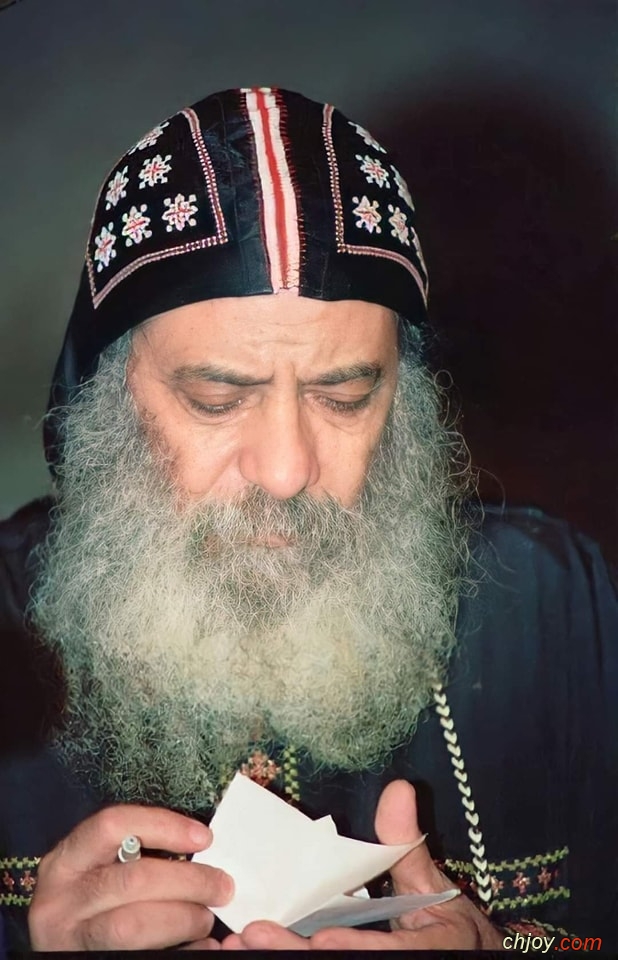
22 - 12 - 2023, 11:11 AM
|
|
|
|
† Admin Woman †
|
|

|
|
|
|
 Pope Shenouda III
The Sanctuary and the Altar
Pope Shenouda III
The Sanctuary and the Altar
There is neither a sanctuary nor an altar in Protestant churches. The reason for this is more serious: There is no Sacrifice. We shall discuss the subject of the Sacrifice when we come to the Sacraments of Eucharist and Priesthood. Now we will confine our discussion to the altar.
(1) In the Old Testament there are numerous passages about the altar. But our brethren the Protestants think that the altar was merely a symbol of Christ's Sacrifice on the Cross, and has now terminated. Therefore, in our discussion with them, we have to present text-proofs from the New Testament.
(2) St. Paul the Apostle says: “We have an altar from which those who serve the tabernacle have no right to eat” (Heb.13: 10). The tabernacle is the Tent of Meeting or the old Sanctuary. St. John Chrysostom comments on this, saying: “St. Paul the Apostle turned from the symbolic meaning to the actual meaning... We now have the authority to partake of the Holy Blood which was the authority of the priest only.”
(3) There is a prophecy in the Book of Isaiah the Prophet about an altar in the midst of the land of Egypt. The prophet says: “In
that day there will be an altar to the Lord in the midst of the land of Egypt. Then the Lord will be known to Egypt, and the Egyptians will know the Lord in that day, and will make sacrifice and offering” (Is. 19: 19,21).
Of course, the altar referred to here is the altar of the New Testament in the Christian Era, because the Jews could not offer sacrifices in a Gentile land, nor would the Egyptians have allowed them to do so. Thus the appeal directed to Pharaoh at the time of Moses and Aaron was: "Let My people go, that they may serve Me" (Ex.8: 20)
. Yet Pharaoh refused to let “the people go to sacrifice to the Lord” (Ex.8: 29). After the Plague of Flies, when Pharaoh gave his first promise, he said: “I will let you go, that you may sacrifice to the Lord your God in the wilderness” (v.28). It is understood from these verses that the Jews could not offer a sacrifice in Egypt.
So when did the Egyptians know the Lord? When did they begin to have an altar and offer sacrifices to the Lord? Undoubtedly, it was in the Christian Era. This is an explicit proof of the existence of altars in Christianity to offer sacrifices on.
(4) God willed that the word ‘altar’ be fixed in the minds and hearts of people, therefore He mentions it more than once in the Book of Revelation which was written at the end of the first century, after the martyrdom of the Apostles and the disciples of Christ. St. John the Evangelist says: “Then another angel, having a golden censer, came and stood at the altar. And he was given much incense” (Rev.8: 3). He also says: “I saw under the altar the souls of those who had been slain for the word of God and for the testimony which they held” (Rev.6: 9).
(5) The altar will continue to exist as long as the words of the Divine Inspiration: “the Body and Blood of the Lord” (1Cor.11: 27) remain before us. As long as there is Blood, then there should be an altar, and by necessity, a sanctuary to contain it.
We shall discuss this subject in detail, God willing, when we discuss the subject of the Holy Sacrifice and the clergyman who offers It.

|




